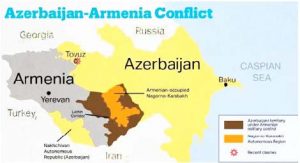Armenia-Azerbaijan War: Global and Regional Capitalists Sacrifice Workers’ Lives for Power and Profits
November 3—Thousands of workers are dying in the conflict in Nagorno-Karabakh between Armenia and Azerbaijan. In this region, national-ethnic groups intermingle, and their territories overlap. Ethnic tensions are being exacerbated and exploited by outside powers. Workers urgently need to turn the bosses’ profit wars into communist revolution.
This war is a qualitative leap in the ongoing Armenia-Azerbaijan conflict. It is part of a larger struggle for control of critical energy resources as well as a developing shift of global power. French, Turkish and Russian capitalists are competing for control of pipelines and jockeying to fill the imperialist vacuum left by the absolute decline in US power.
The New Trans-Caspian Gas Pipeline
The South Caucasus is a crucial artery for gas and oil moving from Azerbaijan into Turkey and on to Europe and other world markets.
Existing pipelines go from Baku, the Azeri capital on the Caspian Sea, to Georgia and on to Ceyhan on Turkey’s Mediterranean coast. These pipelines are crucial for Azerbaijan, and strategically important to the US and Europe. They directly compete with Russia for the European natural gas market.
Recent plans for an underwater pipeline from Turkmenistan to Baku would enhance the strategic importance of Azeri pipelines. They would also allow Europe and Turkey access to energy resources from Turkmenistan’s gigantic gas fields. Turkmenistan currently only sells that gas to China and Russia. The Trans-Caspian Gas Pipeline would strengthen Turkey’s influence in the region and lessen Chinese and Russian influence in Central Asia.
Turkey and Russia: Unity and Competition
Turkey has aggressively armed and encouraged the Azeri bosses. Russian artillery based in Armenia is destroying Turkish-made drones being deployed by the Azeri military. But Russia has sold arms to both sides. Its support of Armenia is limited. Its mutual defense agreement with Armenia does not include Nagorno-Karabakh, which, under international law is part of Azerbaijan.
Red Flag reported, a year ago, about the US troop withdrawal from northern Syria, and the unstable peace brokered between Russia and Turkey along the Turkey-Syria border. The US was already increasingly irrelevant in the region, while strategically pivoting to Asia.
Now the irrelevance of the US is even clearer. An October 26 US-brokered peace deal, which Trump claimed was an “easy job,” lasted barely an hour.
Both Armenia and Azerbaijan were Soviet Republics until 1991. They have remained within the Russian sphere of influence. Russia co-chairs the Minsk Group, with France and the US, created in 1994 to resolve territorial disputes between Armenia and Azerbaijan,
Turkey, excluded from that discussion, has increasingly pushed for regional influence. It backs the Azeri rulers, diplomatically and militarily. Turkey is sending Syrian fighters on Azerbaijan’s side, the same ones it has deployed inside Northeast Syria.
In Libya, oil revenues are also an important factor in the involvement of Russia and Turkey on opposite sides of the civil war. Turkish president Erdogan plays a major role in propping up the Government of National Accord (GNA) in Libya. This government is in an ongoing conflict with the Russian-backed insurgency known as the Wagner Group. The fighting in Libya risks involving Egypt as well as other north African states.
In November 2019, Turkey signed an oil drilling deal with the GNA which would cut across the drilling rights of Greece and Cyprus in the eastern Mediterranean. Turkey has risked European Union sanctions by sending military-backed exploration ships into Greek and Cypriot waters.
While Turkey and Russia jockey for influence, they are not on an inevitable path to all-out war. Just this summer, Turkey agreed to buy a second shipment of S-400 defense missiles from Russia. This 2017 arms deal created a crisis in US-Turkey relations, but Turkey did not submit to US pressure.
The absolute decline of US imperialism has destabilized a large part of the world. The Minsk group, especially without regional powers Iran and Turkey, has limited prospects of brokering a stable peace.
Imperialist and regional powers continue to sacrifice the lives of workers in Armenia, Azerbaijan, Libya, Syria and elsewhere for the sake of profitable and strategic energy resources. Broader wars are the future.
But the working class will not allow itself to be sacrificed forever. We must speak to its disillusionment with socialism with a clear vision of communism. When capitalist-imperialist rulers mobilize masses for their wars, they create more opportunities for the communist revolution we so desperately need.


